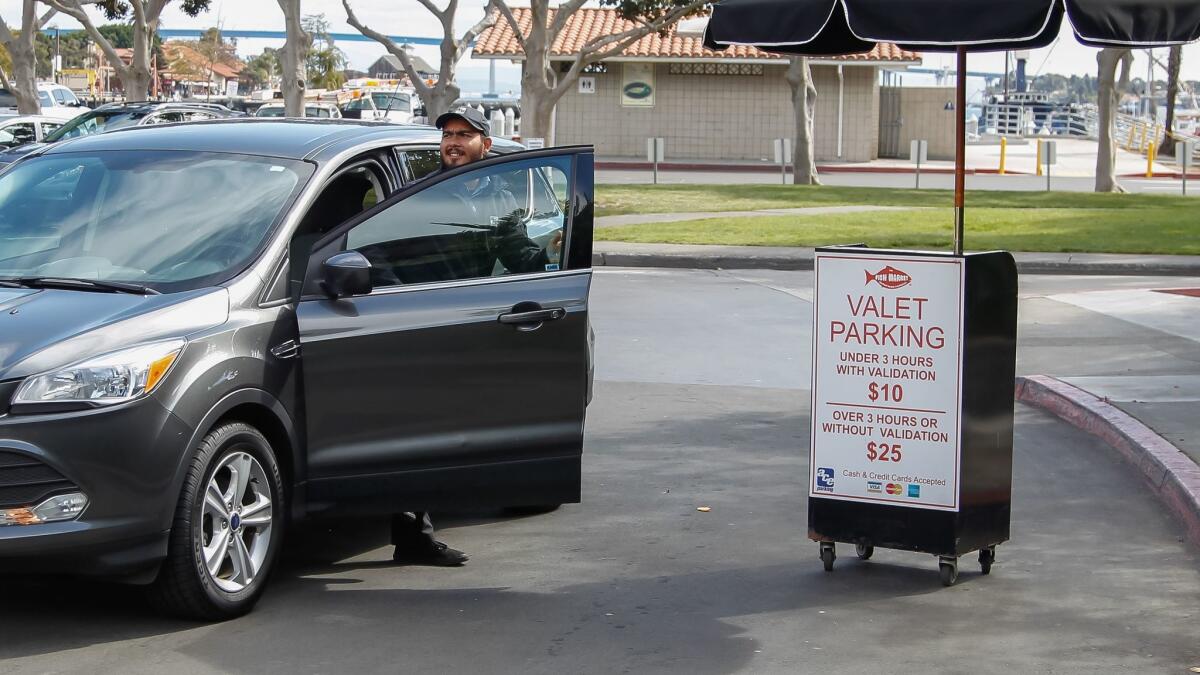Uber and Lyft are forcing Southern California parking companies to adapt or die

- Share via
The rapid rise of ride-hailing services such as Uber and Lyft has taken a big bite out of businesses that rely on people who need to park their cars. Now they’re facing a choice: keep dwindling, or innovate.
Proper Parking, based in Woodland Hills, has seen a 70% drop in nightclub valet traffic since it started six years ago, said Brandon Helfer, the company’s president. In addition, it has seen a 30% drop in restaurant traffic and a 25% drop at weddings.
“At some nightclubs, we used to park 60 or 70 cars per night,” Helfer said. “It got to the point where we were parking 10 to 20.”
Nightclubs and restaurants, once pillars of the industry, are no longer reliable sources of revenue, Helfer said. In the industry’s heyday, valet companies used to turn such a profit off the gigs, they would pay the venue owners for the right to operate there.
Now the roles have reversed. Those same venues often have to pay the parking companies if they want a valet presence out front.
Helfer’s company is far from the only one affected. Parking expert Casey Wagner, who hosts a National Parking Assn. webinar on the rise of the sharing economy, said the numbers point to ride-hailing services taking a big bite out of the parking, car rental and taxi industries.
Proper Parking — founded in 2012, the year Uber rolled out its services in Los Angeles — was born into a world already familiar with ride-hailing services. It’s openly confronting the change in the industry, finding new ways to profit off its parking services and changing the ones that fail.
For starters, that means diversification.
“Back in the day, our business philosophy was to get as many nightclub and bar accounts as possible, but now we’re shifting toward management valet,” Helfer said.
Proper Parking leases lots across Los Angeles. Generally, the company uses the properties as straightforward paid parking lots, but when the season is right, it transforms them into a different kind of moneymaker.
In October, Proper Parking turns nine of its asphalt lots into hay-filled pumpkin patches called Mr. Jack O’ Lanterns Pumpkins. Come Christmastime, it runs tree-selling operations there dubbed Mr. Jingles Christmas Trees.
It can be a hassle to relocate monthly parking tenants, but Helfer said the hybrid lots drive up profits.
“You have to get creative,” Helfer said. “Unless your lot is right next door to the Staples Center, you have to find out-of-the-box ways to generate revenue.”
Proper Parking isn’t the only one branching out; deeply rooted companies across Southern California are searching for answers. This year, the San Diego Union-Tribune reported that Ace Parking, the San Diego-based parking giant, has seen a 50% drop in nightclub valet traffic and a 25% drop in restaurant valet traffic.
“The entire parking industry is evolving,” said Mike Estey, spokesman for the International Parking Institute. “We’re not just parking professionals anymore; we’re parking, transportation and mobility professionals.”
Those three buzzwords encompass a litany of challenges facing the industry. Uber and Lyft have shaken things up in recent years. Autonomous cars — which don’t need to be parked near a person’s destination, since the vehicles can just drive themselves away after the riders get out — are about to wreak havoc on the status quo.
There’s also the crucial issue of “curb management”: local governments’ policies on who gets to use the valuable space at the side of the road. Space at the curb can be used for driving, paid parking, free parking, drop-off zones, valet areas and food trucks, but it can’t host all those things at once. Decisions about who gets priority have ripple effects on all players in the transportation industry.
“We’re moving from parking to a broader set of responsibilities,” Estey said. “We need to figure out how people move around urban areas.”
A report released by the International Parking Institute tracking reasons for radical change in the parking industry found that 62% of the parking professionals surveyed said ride-hailing companies are a major factor.
Additionally, half of the responses said there’s a demand for mobile applications that provide real-time information on parking pricing and availability. Helfer agrees.
For lots with monthly parkers — at an office, for example — Proper Parking offers an app to speed up the process. If someone in the lot plans to eat lunch at noon, they can punch it into the system from their phone and have their car waiting for them. It’ll even shoot them a text that thanks them for parking with Proper.
The company currently uses the system in only two lots but plans to implement it in others too, for an extra fee.
“Lots of accounts are looking for this type of service, especially ones with tech-savvy tenants,” Helfer said.
With an on-site employee and set parking spots, the concept should be able to avoid the pitfalls of failed, tech-fueled valet start-ups. Start-up Luxe raised $75 million on the promise of delivering an app that would send a valet to a rider’s location at the touch of a button, but parking scarcities and thin margins drove the company into the ground.
Helfer firmly believes valet is here to stay, noting that a clean-cut employee ready to take the keys is an important part of the image for certain spots, especially in Los Angeles. But the companies unable to meet the growing needs of the tech-savvy driver, he said, will be the first to go.
Twitter: @jflem94
Jeanette Steele of the San Diego Union-Tribune contributed to this report.







